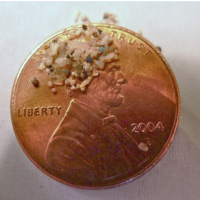States Slowly Move to Ban Microbeads from Soaps and Facial Cleansers
 Microbeads (photo: 5 Gyres Institute)
Microbeads (photo: 5 Gyres Institute)
Microbeads, a plastic additive to many personal care products, may be on the way out in several states where concerns have grown over their impact on environmental pollution.
No larger than grains of sand, microbeads have become a popular addition to many facial cleaners, soaps and even toothpaste. Manufacturers of these products, which include Clinique Exfoliating Scrub and Kiehl’s Facial Fuel-Energizing Scrub-Skin buffer for Men, claim the tiny plastic particles help provide a deeper clean without sacrificing comfort.
But environmentalists found microbeads exacerbate water and soil pollution. The non-biodegradable ingredients can absorb toxins in lakes and waterways, creating deadly concentrations consumed by fish that mistake the beads for food.
More than 350,000 of the beads can be found in a single tube of face wash. Given the popularity of such products, the accumulation of microbeads in ecosystems has easily reached into the billions.
That’s why groups like the 5 Gyres Institute, which is dedicated to reducing plastic pollution in the ocean, are encouraging state lawmakers to order the phaseout of microbeads.
Bills have been introduced in Illinois, New York, California, Ohio and Minnesota. The Chicago Tribune reports that the Illinois legislation, which cleared the state Senate, stands a good chance of becoming law.
Industry representatives are supporting this bill, in large part because it gives manufacturers more than four years before a ban on microbeads would go into full effect.
But Stiv Wilson, associate director of the 5 Gyres Institute, says the Illinois plan is too slow, “putting the environment at a much greater a risk” because of the “very non-aggressive timeline for phase-out,” he told the Tribune. Other states, such as New York and California, want to ban microbeads by 2016.
Not surprisingly, many cosmetic producers are opposing those bills, saying their timelines are too aggressive and that companies need more time to switch to alternative environmentally safer ingredients.
Some companies, however, are already planning to do away with microbeads. Unilever says it will halt use of the beads by 2015. Johnson & Johnson, Procter & Gamble and Colgate-Palmolive have said they will phase out microbeads in the next few years.
How can you tell if a product contains microbeads? Check the ingredients label for polyethylene or polypropylene.
-Noel Brinkerhoff
To Learn More:
Illinois Could be First State to Ban Microbeads (by Michelle Manchir and Taylor Goldenstein, Chicago Tribune)
Skin-Cleansing Microbeads Harm Marine Life, Targeted for Bans (by Melody Gutierrez, San Francisco Chronicle)
- Top Stories
- Unusual News
- Where is the Money Going?
- Controversies
- U.S. and the World
- Appointments and Resignations
- Latest News
- Musk and Trump Fire Members of Congress
- Trump Calls for Violent Street Demonstrations Against Himself
- Trump Changes Name of Republican Party
- The 2024 Election By the Numbers
- Bashar al-Assad—The Fall of a Rabid AntiSemite






Comments